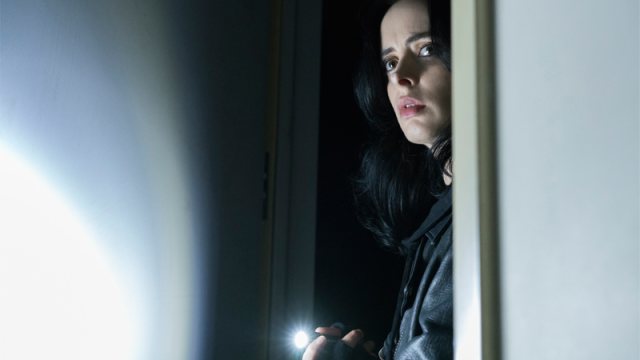We’ve been reunited with the Marvel universe’s best, and drunkest, private investigator, the one and only Jessica Jones. There was a lot to like in Jess’ sophomore season, but there were some things that didn’t quite work for us. Here’s our spoilery thoughts on Jessica Jones season two.

We Loved…
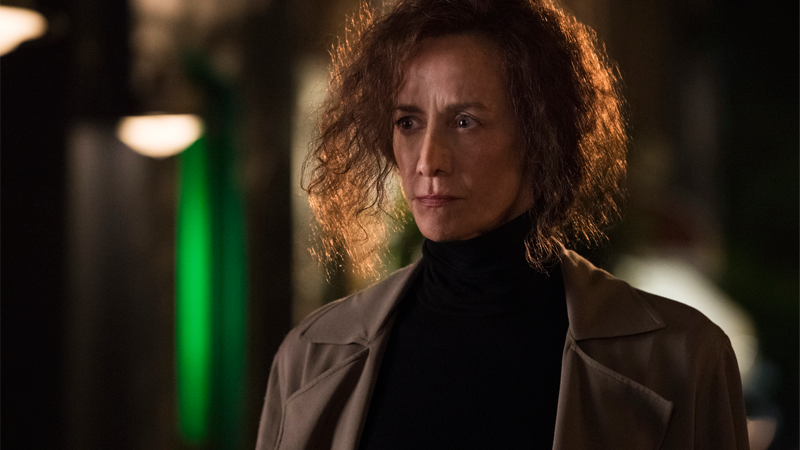
Janet McTeer as the most shocking character of season 2, Alisa Jones.Photo: David Giesbrecht (Netflix)
The Alisa Reveal
So much of the first half of season two leaves you wondering what the big “deal” that will drive the whole season forward is actually going to be. It builds up so many little potential threads — Jess’ investigation into IGH, Trish’s slow slide into obsession, a spooky monster killing superpowered individuals, even a rival P.I. in the form of Pryce Cheng – that you’re left wondering what it’s all building up to. This makes the actual revelation at the end of “AKA Facetime,” that the villain Jess has been chasing down is actually her own mother (transformed into a super strong but damaged killer in the wake of the car accident she was meant to have died in), such a fantastic moment. It’s a major divergence from Jess’ comic book origins, but in a way that keeps both fans of the series and the comics surprised. And it lays the groundwork for some really tough, emotional moments to come in the season.
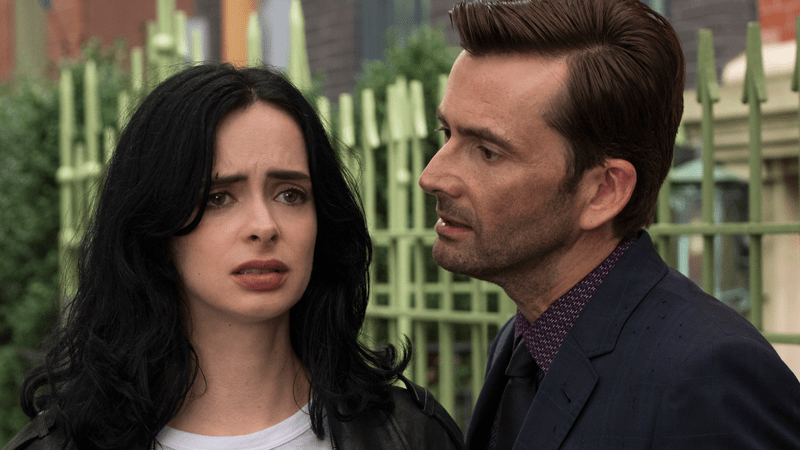
Kilgrave (David Tennant) gets into Jess’ head.Photo: David Giesbrecht (Netflix)
Kilgrave’s Return
After using a tremendously evil villain for season 1, Jessica Jones season two made the bold move of forgoing a traditional “bad guy.” Your mileage on that may vary, but Kilgrave’s reemergence as a figment of Jessica’s troubled mind was perfect. The reveal could have been even better if it had come sooner (had the season been condensed), but his appearance was a potent reminder of what Jessica had been struggling with inside. We were seeing her conflicts the whole time but she wasn’t vocalizing many of them to her friends — and David Tennant’s appearance was able to put a physical component to it for the audience. It was another incredible performance that put tension and drama into a season that was otherwise lacking in it.
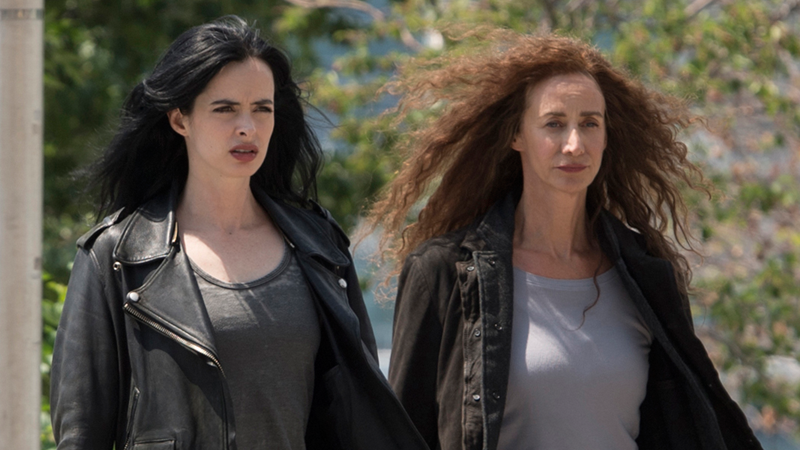
A moment of mother/daughter “dramatic windswept hair” bonding.Photo: David Giesbrecht (Netflix)
The Mother-Daughter Themes
Even though we had to wait for halfway through the season to get it, Jessica’s mother making an unexpected return to her life was the best addition to the continuing story. Jessica’s past family dynamics ranged from happy-go-lucky memories to horror and abuse, so getting back a member of her family she thought she lost and had nothing but goodwill toward, but having her be a complicated mess, seemed par for the course. But it was the quieter moments of their scenes together – making breakfast, taking road trips, yelling at an idiot cab driver — that made Jessica and Alisa feel so genuine.
Alisa, despite what was done to her, wanted to protect Jessica. Jessica, despite being perfectly aware of the evil her mother had done, wanted to have the life she missed. Even when Alisa was talking about murder specifically, you couldn’t help but feel her deep love for her daughter. And then, of course, there were the moments they were heroes together. If that didn’t tug at your heartstrings we don’t know what will.
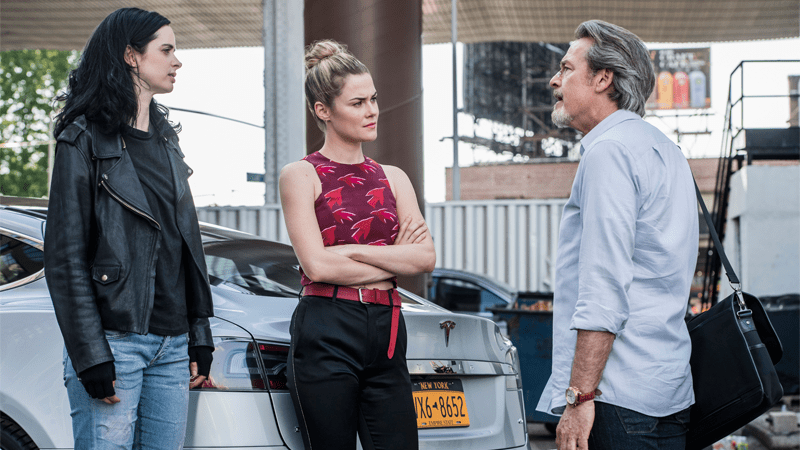
The contrast of Jessica Jones season 2 having an all-female director list while having a subplot about a shitty male director was kind of perfect.Photo: David Giesbrecht (Netflix)
The Direction
The second season of Jessica Jones had all the smart and stylish visual trappings of the first, like a great use of colour and voyeur-esque camera angles. However, this time around, all 13 episodes were directed by women, and you could really see that in how they framed the characters and situations. Sex scenes felt more intimate, states of undress weren’t exploited, and there was a real sense of connection between Jessica and her mother. It was all really refreshing.
There were also some smart directorial choices that enhanced the storytelling as a whole – most notably the use of shallow focus. Alisa’s season-long struggle was about her inability to look past her immediate needs, whether for survival, revenge, or human connection. In her “Beast Mode” moments, like her desire to kill Trish, the camera turned to shallow focus in order to represent her inability to see anything beyond what she wanted in that moment.
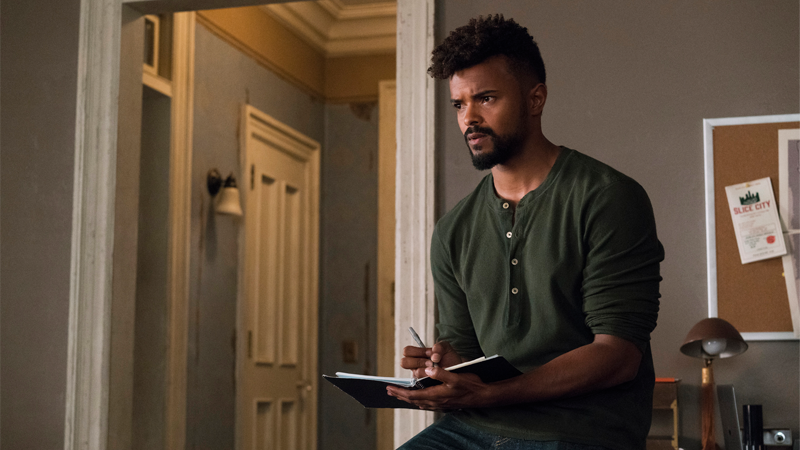
That poor notebook, never filled with good P.I. advice.Photo: David Giesbrecht (Netflix)
Malcolm’s Whole Arc
The standout character in the second season of Jessica Jones – well, besides Jessica of course – was Malcolm Ducasse. Having spent much of the first season as a drug addict and victim of Kilgrave, Malcolm is now a man in recovery, constantly having to face and overcome the mistakes of his past, one day at a time. What we really appreciate about his story is that it isn’t about a man who’s “moved on” from his past, because that’s not what recovery is. It’s a daily effort that requires a great deal of strength, resolve, and courage — and sometimes, even that’s not enough.
It was a perilous feeling every time we saw a bottle of liquor in Malcolm’s line of sight. When he had a moment of weakness, taking Trish’s inhaler, his first instinct was to run… as far away from his mistakes, and his past, that he could. He ends the season having removed himself from Jessica’s life, for his personal and professional health, which felt bittersweet but also necessary for his recovery.
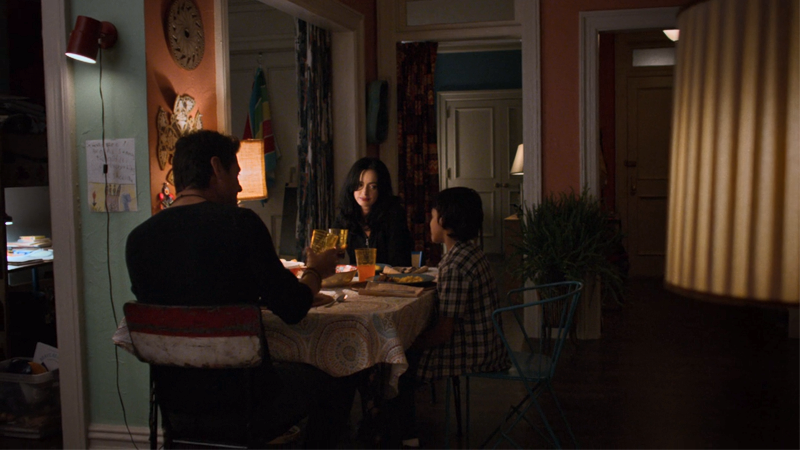
Jess has dinner with Oscar (J.R. Ramirez) and Vido (Kevin Chacon) in the season’s final moments.Screenshot: Netflix
The Final Moments
Season two ends with a lot of what we know as the main cast of the show fractured. Jess is once again tragically alone – not only having lost her mother a second time, but having pushed away both Malcolm and most importantly Trish (seemingly for good) in the process. A grimmer series would have ended there, with Jess wallowing in her solitude.
But instead, the final moments of season two are touching and beautiful: rather than finding her usual comfort at the bottom of a bottle, Jessica Jones reaches out to someone else. That someone being her new love interest, Oscar, and his son Vido as they sit down and share dinner together, with Jessica recounting her heroics to them both over their meal. “I hate starting at the beginning,” Jess’ voiceover intones, but it’s such a lovely and hopeful way to cap the season off.
We Didn’t Love…
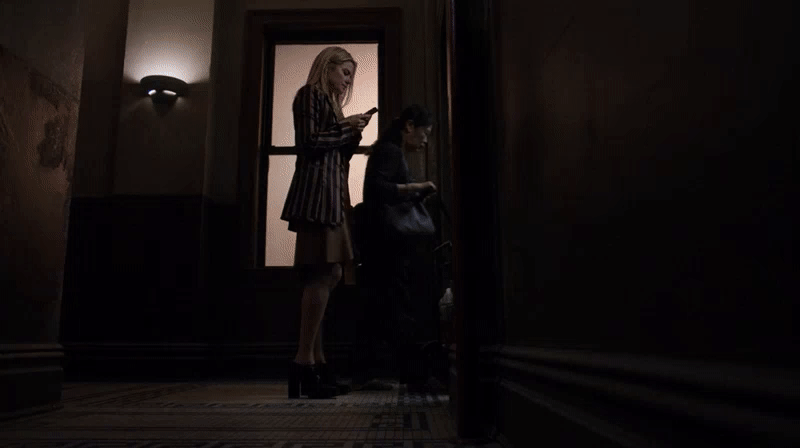
Good reflexes, or Hellishly good reflexes?Image: Netflix
The Resolution of Trish’s Story
A lot of us really want to see Trish Walker become Hellcat, her comic book persona it looks like that’s what happening. Unfortunately, the way it came about was really upsetting and went against the progress we wanted to see her make as a character. Throughout season two, Trish was struggling with jealousy over Jessica’s abilities, as well as her own inability to change the world the way she wanted to. So, she turned to drugs — specifically, a steroid inhaler that enhanced her focus and strength – falling back on her old addictive behaviour that she’d spent years recovering from. By the end, Trish sacrificed everything (her career, her love life, her principles) in the name of envy.
Her final decision to have Dr. Karl Malus perform the same operation that was forced upon Jessica highlighted her hypocrisy and descent into the Bad Place. If this had concluded with Trish learning the strength of her own gifts and no longer coveting Jessica’s, it could’ve been an interesting arc. Instead, Trish supposedly gains superpowers. Given the season’s themes of addiction and recovery, having Trish rewarded for falling to her lowest point felt like a “must add new Marvel hero” push rather than a meaningful character journey.
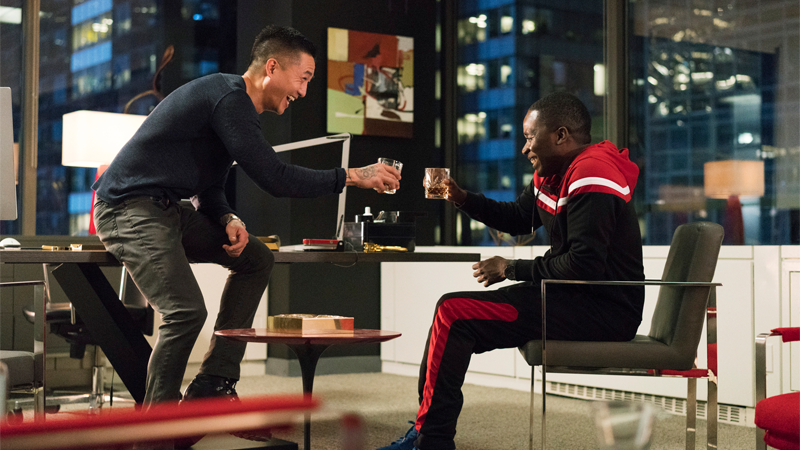
Pryce Cheng (Terry Chen) celebrates his impending lack of importance in Jessica Jones season 2.Photo: David Giesbrecht (Netflix)
The Rival P.I. Storyline
Early on in the season, Pryce Cheng, a slick, dominant force in New York’s apparently bustling private investigator industry, is introduced as another big potential thorn in Jessica’s side. The first two episodes give Cheng a lot to do (and the chance to get beaten the hell up by Jess for trying to muscle in on her clients), but then he’s almost completely dropped for much of the rest of the season. In the end, Cheng only serves as a figure for Malcolm to turn to after Jess pushes him away for the last time, cropping back up in the final episode. It’s such a weird role to focus so strongly on in the opening parts of the season, only for it to matter so little, that it feels like filler the show desperately didn’t need. Speaking of which…
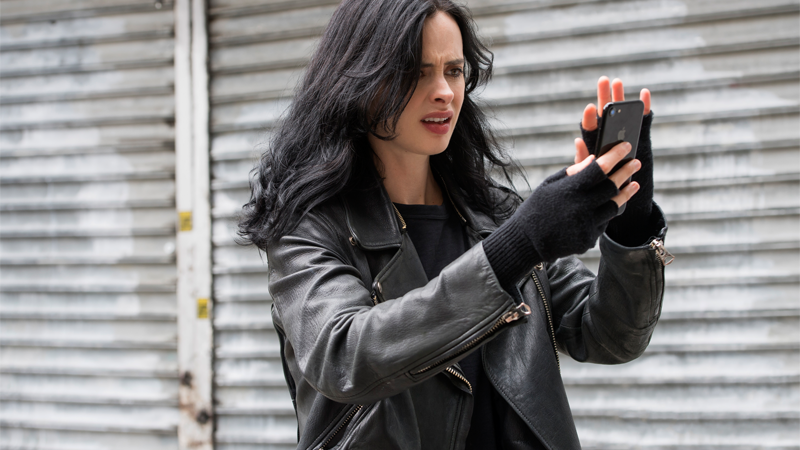
God, this show is how long???Photo: David Giesbrecht (Netflix)
The Pacing Is Still a Little Off
Every Marvel/Netflix show, even the shorter Defenders, has struggled with pacing, and Jessica Jones season two is no exception. While it’s not as problematic this time around as it was in season one — which built up to a crescendo before slamming the breaks on around its eighth episode, before picking back up by the time of the finale – season two starts with a major slow burn. It steadily builds up and up in the back half in a much stronger manner, but the dragging pace of the first five or so episodes of the season has us wondering the same thing we wonder after almost every one of these new seasons: Wouldn’t it be better if these shows were 8-10 episodes long instead of 13?
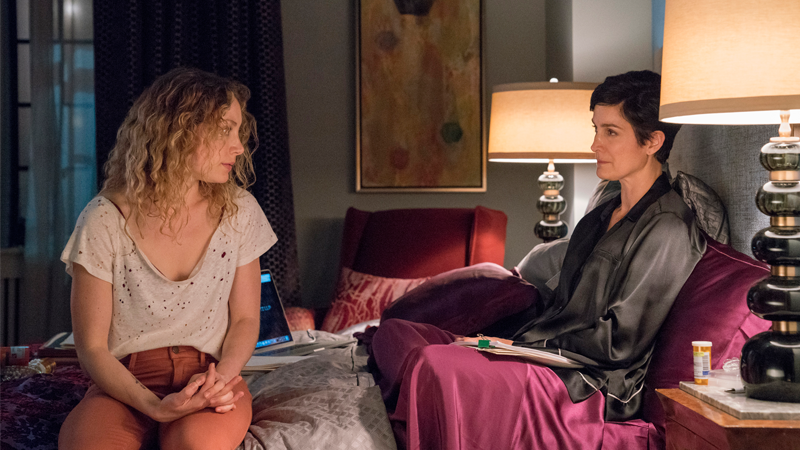
Jeri Hogarth (Carrie-Ann Moss) and a destructive new force in her life, Inez (Leah Gibson)Photo: David Giesbrecht (Netflix)
Jeri Hogarth’s Subplot
In season one, Carrie-Anne Moss’ Jeri Hogarth was certainly a standout and practically the definition of a complicated female character. She was well written and had an incredibly dramatic story that tied directly into Jessica’s, but this time around she was basically on her own and we’re not sure that worked to her advantage. The wicked lawyer was given a diagnosis of Amyotrophic lateral sclerosis. Also commonly known as Lou Gehrig’s Disease, ALS is a progressive neurodegenerative condition with no cure. Searching for possible help outside the legal or scientific realms, it looked like there was a very real possibility Marvel could be working in a back-door pilot for Jeri as She-Hulk.
And then her very extensive, very time-consuming storyline left her… basically exactly the same place she started. There’s no doubt Jeri’s diagnosis will continue to affect her should Jessica Jones go into a season three, but as it stands she barely had any character growth for a story that took up a significant part of the new season – and also didn’t really have any consequences for our main character.
